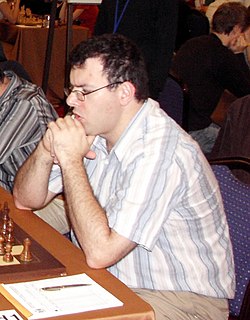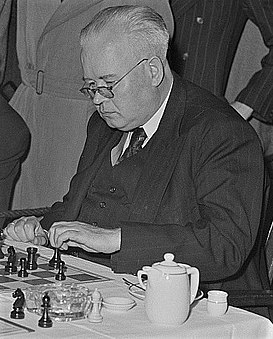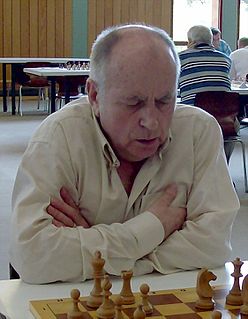Related Research Articles

The Chess Olympiad is a biennial chess tournament in which teams representing nations of the world compete. FIDE organises the tournament and selects the host nation. Amidst the COVID-19 pandemic, FIDE held a one-off Online Chess Olympiad with a rapid time control that affected players' online ratings.

Emil Sutovsky is an Israeli chess player. He was awarded the title Grandmaster by FIDE in 1996. Sutovsky is the FIDE Director General since 2018. He was the president of the Association of Chess Professionals from 2012 to 2019.

Karel Hromádka was a Czech chess player, two-time Czech champion, 1913 and 1921 (jointly).

Karel Opočenský was a Czech chess master.
Carlos Skalicka was a Czech–Argentine chess master.

Luis Argentino Palau was an Argentine chess master.

Carl Oscar Ahues was a German chess International Master.

Ludwig Rellstab was a German chess player who won the German Chess Championship in 1942 and was awarded the International Master title in 1950.

Alon Greenfeld is an Israeli chess grandmaster and trainer.
Oskar Naegeli, was a Swiss dermatologist and chess master. He represented Switzerland at the Chess Olympiads in 1927, 1928, 1931 and 1935, as well as at the unofficial Olympiad in 1936 at Munich.
Lajos Asztalos was a Hungarian chess International Master, professor, and teacher of languages.
The World Amateur Chess Championship is a tournament organised by FIDE. The world governing body intended to promote amateur chess play by holding championship tournaments linked to the Olympic Games, but only two events were held.
František Zíta was a Czech chess master who was born and died in Prague.
The 3rd unofficial Chess Olympiad was held by German Chess Federation as a counterpart of the 1936 Summer Olympics in Berlin with reference to 1924 and 1928 events. FIDE's position regarding the Munich Olympiad was set out on pages 10–11 of the minutes of its Congress in Warsaw in August 1935. In short, given that parts of the German Chess Federation's statutes were anti-Semitic, FIDE could have no involvement in the Munich Olympiad. However, since Germany had agreed, for that event, to drop its ban on Jews, FIDE's General Assembly voted to leave Federations free to decide whether or not to participate. Finally, many Jewish chess players took part in the event. Significantly, the "Jewish" teams of Hungary and Poland beat "Aryan" Germany. Also Jewish masters from other countries played leading roles there.
Emil Zinner was a Jewish-Czech chess master.
János Balogh was a Hungarian–Romanian chess master. He was a Romanian Champion in 1930.

Vlastimil Jansa is a Czech chess player. He was awarded the titles of International Master, in 1965, and Grandmaster, in 1974, by FIDE.

Peter Heinrich Wilhelm Schönmann (Schoenmann) (7.4.1889–15.5.1970) was a German chess master.
Wilhelm Ernst was a German chess master.
Emil Ungureanu was Romanian chess International Master (1978), Romanian Chess Championships medalist.
References
- ↑ Gaige, Jeremy (1987), Chess Personalia, A Biobibliography, McFarland, p. 353, ISBN 0-7864-2353-6
- ↑ Sunnucks, Anne (1970), The Encyclopaedia of Chess, St. Martin's Press, p. 404, LCCN 78106371
- ↑ Richter, Emil: Unofficial Chess Olympiads, Olimpbase.org, retrieved 16 July 2011